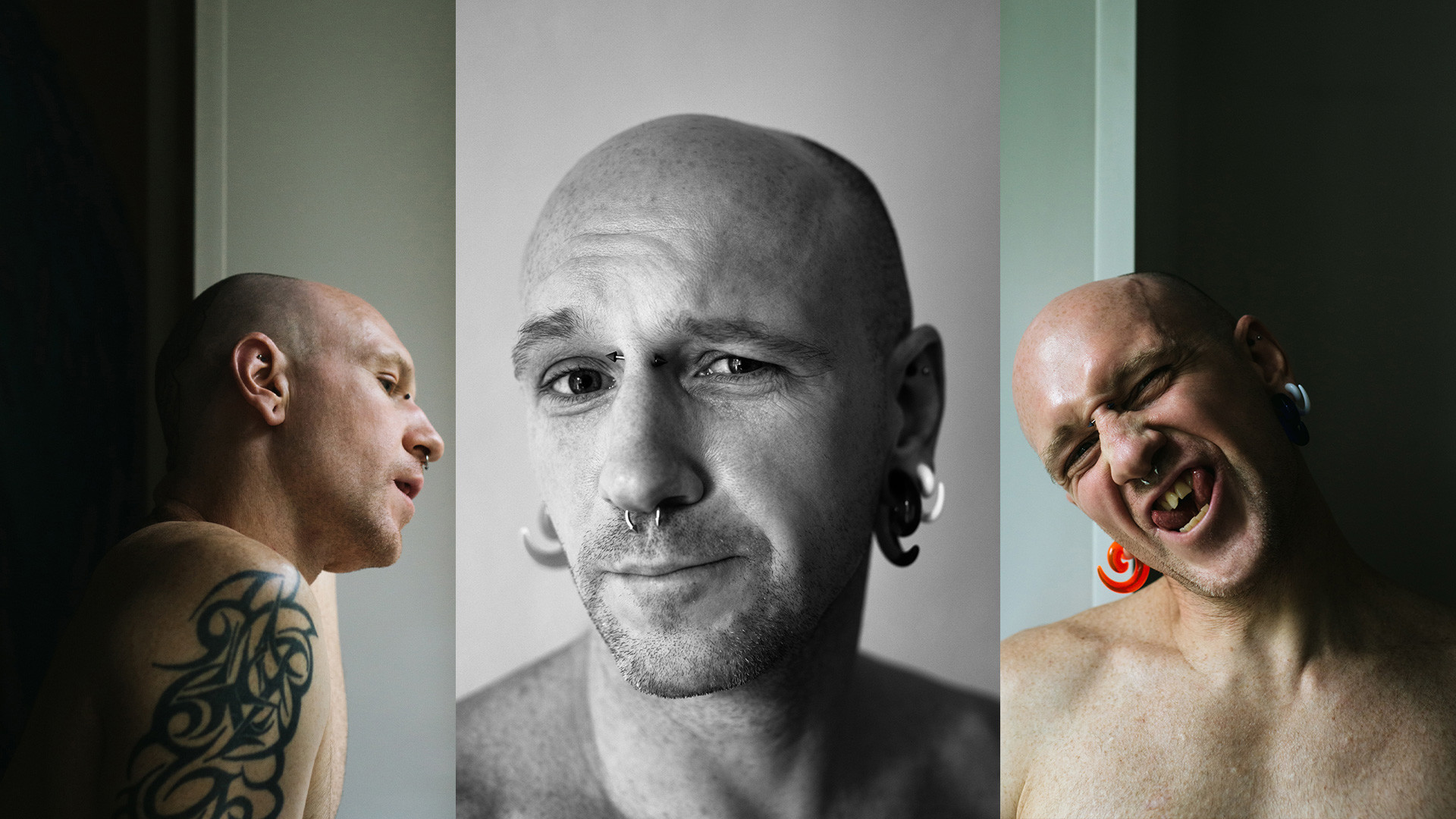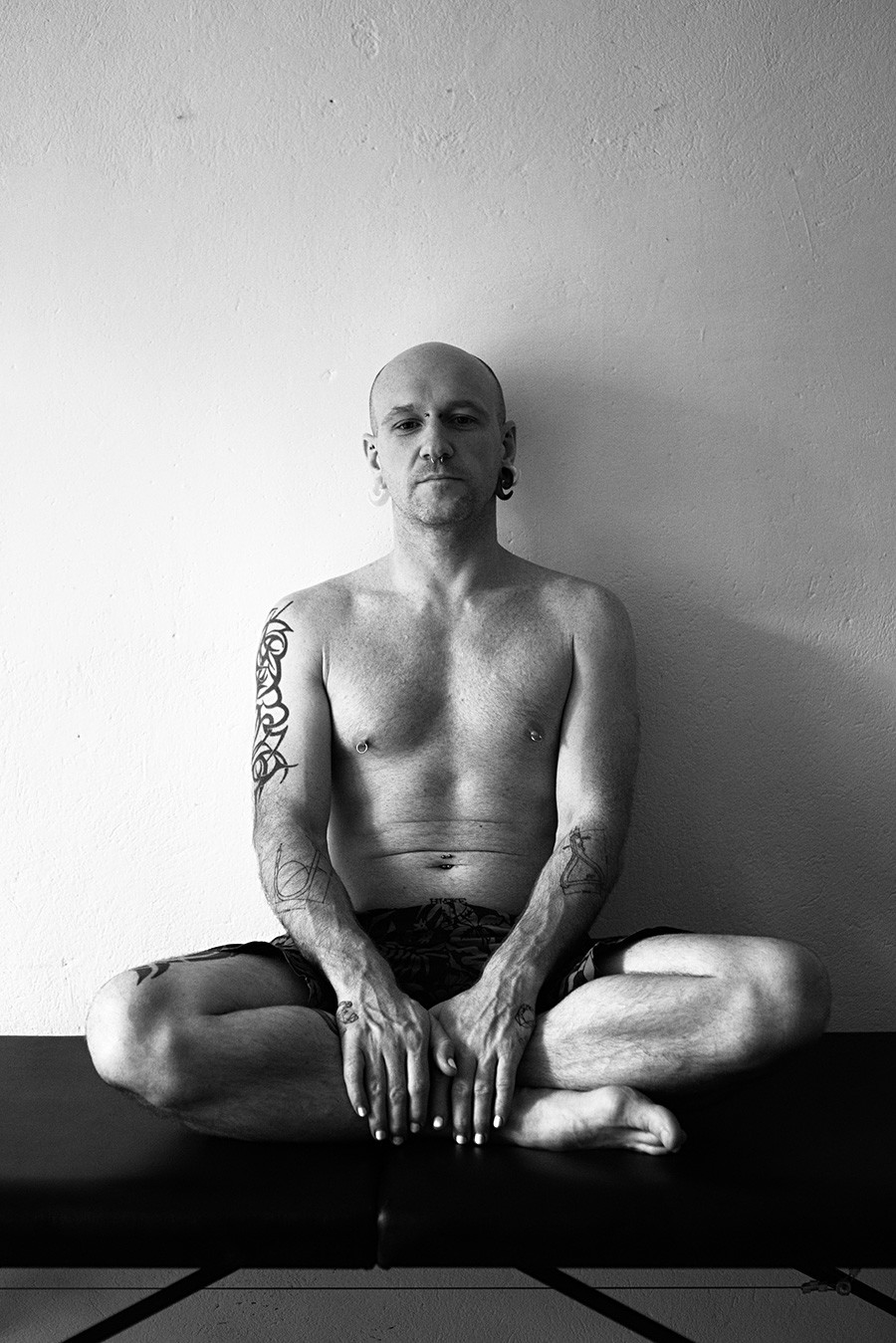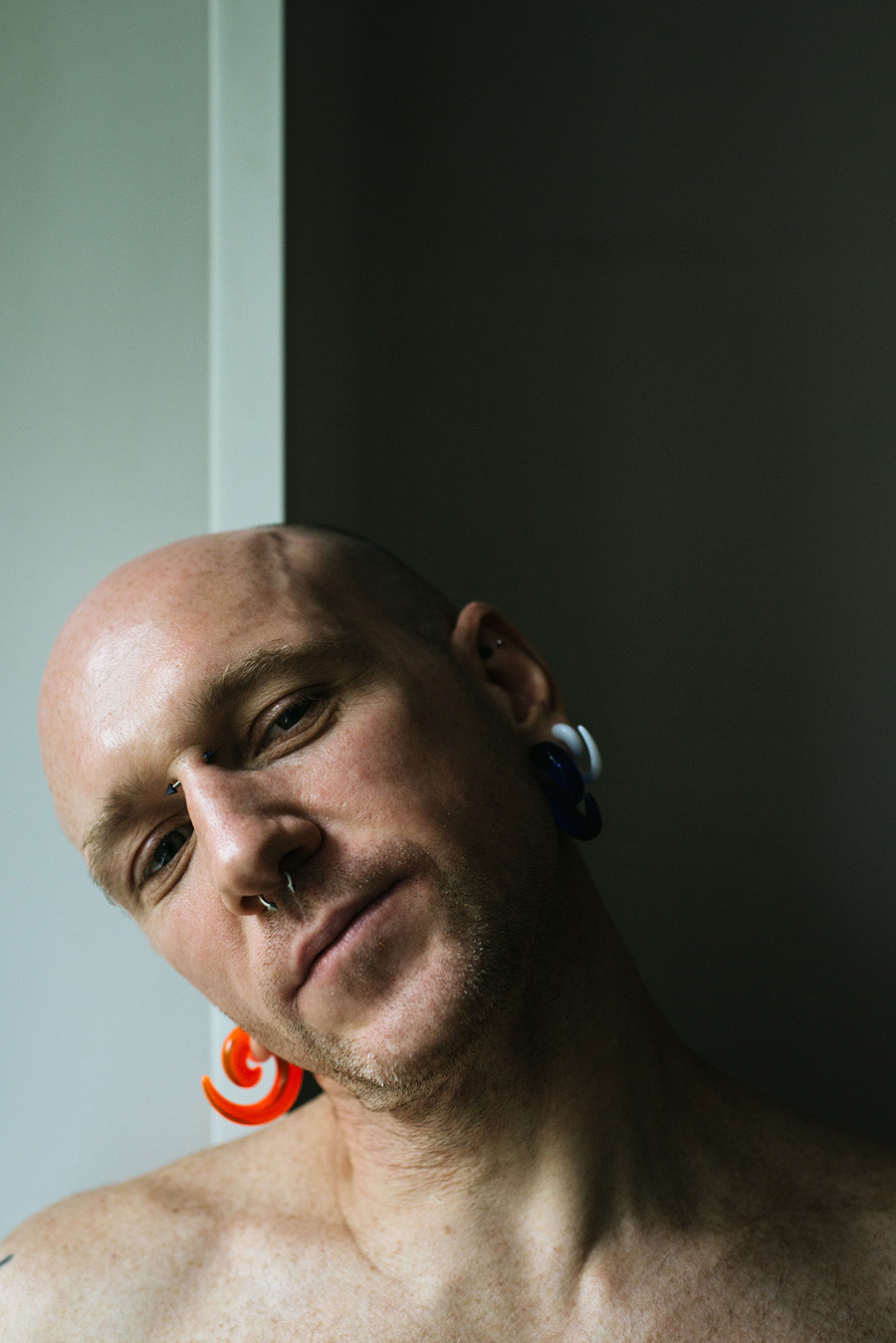
“People and the media try to make out I’m a freak. No one wants to know what I actually do. Sometimes I spend hours explaining how my job differs from prostitution. Nobody knows I was once married and raised a child, being a ‘tattoo freak.’ Everyone thought I was an alcoholic and drug addict. F*** social labels, they don’t work,” says Anzol.
I’m talking with Anzol in the cozy kitchen of his small Moscow apartment. He doesn’t give his age and refuses to talk about his childhood or first girlfriend. He notes that he lives in two cities — Moscow and St Petersburg, and for 17 years worked as a manicurist. Why Anzol chose this profession, and what he studied at the university (if he went there at all), we don’t know either. I could describe in detail the color of his nails and his earrings and tattoos, but for him these are all superficialities that prevent getting to know the person underneath.

Far more important for Anzol is who he is today. He calls himself a “practitioner of sexual interactions” or surrogate partner — someone who helps others to overcome issues of intimacy and sexuality using both verbal and physical techniques.
Surrogate partners are not officially recognized in Russia, but that does not stop many Russians from experiencing problems with sex. According to a 2017 survey of 15,000 people by online portal Health Mail.ru, half reported a lack of sex, and 13% had not had sex at all in the past year. Another 36% of respondents were dissatisfied with the quality of sex they were having, and half preferred not to discuss sex issues with their partner.
“I never talked about sex with my parents. So I'm basically self-taught. I learned about sex from pornographic playing cards and books. Porn was new in Russia in those days, and for me it became a guide to all the different forms and positions. I taught myself how to feel,” says Anzol.
Anzol had traditional relationships with four different girls over a period of 15 years. It wasn’t that he disliked it, but found the implicit moral code irritating.
“You have sex just once, and then a million obligations are imposed on you. Many people have relationships, live together, even get married, but all the time what they need from each other is just sex. They both suffer as a result. It’s wrong,” argues Anzol.
When his most recent monogamous relationship collapsed, causing a long bout of depression, he decided that henceforth he would have as many partners as he wished.

“Every day I choose the number of women I want. It might be one or five or eight over a period of time, or no one at all. What matters is that my [occassional] monogamy is my own conscious choice, not an enforced model of behavior” Anzol explains.
It wasn’t long before he went to his first kinky party — a female friend took him there on a leash, saying that he was "her animal." There he met the organizers, and soon began to work at events himself, as a dress-code enforcer and scenery supervisor. As part of the sex-positive community, Anzol began doing yoni (intravaginal) massage and giving talks on shibari (rope bondage) and various sexual practices.
Anzol cannot say when exactly he became a surrogate partner. One day he simply realized that’s what he was and always had been.
“There have been many times when a woman came to have sex with me, but in the end our contact became therapeutic. For example, she understood she wasn’t frigid and everything was in ‘working order.’ Or that she’d had her first ever orgasm. Or her mindset had changed as a result of our dialogues, and she’d started building relationships and having sex in a different way,” Anzol explains.

He admits to having felt drained afterwards, as he had invested a lot of his own emotional energy in the treatment.
“That was when I separated my personal and professional lives, and starting charging money for the sessions, just like normal therapy,” he says. An hour with Anzol costs 2,000 rubles ($30); sessions can last up to four hours.
Imagine coming home after work to a stranger. You nervously enter the apartment and straighten your hair. You are greeted by a man radiating calm and confidence. Over tea, you tell him all your sex-related problems. Alcohol is strictly prohibited. Perhaps you were embarrassed to talk to your husband, best friend, or mother for fear of being misunderstood or judged. Perhaps you even prefer sharing it with a stranger who is smarter and more experienced than you. You may not realize it, but the "therapy" has already begun.
“People come to me when psychologists and sexologists are no longer helping. I don’t have a specific program, I don’t guarantee results, I don't do ‘special offers,’ I don’t try to persuade clients to keep coming. They tell me what they want during the first hour and a half. Then we decide what they need and how I can help. We can just lie down next to each other, have sex, or I can do a massage. Or I can simply answer questions about sex, sometimes that’s enough,” Anzol says about his work process.
Sex is necessary when the client wants to learn something new, or practice a new technique or behavior in bed.

Most female clients complain about a lack of orgasm or pain during sex. Less often they come for their first sexual experience. There are also clients who want to learn how to refuse an aroused man.
“Not everyone is able to say no, because Russian society imposes a certain model of behaviour, such as a woman should always have sex with her boyfriend. Men often pressurize them. But sex through coercion is not really what a woman wants,” says Anzol.
Anzol also complains that the government does nothing to help people with disabilities overcome their sexual problems; for example, people who can’t masturbate because they have no arms are not a top priority, to say the least.
“I haven’t had any disabled clients yet, but am in touch with a woman who has cerebral palsy. She’s planning to come next month to see what I can do for her,” he says.

Most of Anzol’s clients are women, and less often couples. But even when it’s a couple, it’s the woman who has the complaints. They find him by word of mouth.
In rare cases, a female client might become infatuated after several sessions, and Anzol sees nothing wrong with that.
“I talk to her, explain that she can’t demand reciprocation from me, because I’m not a friend or close person. Infatuation is a resource that you can write a dissertation about and make money from. Having the right experience of infatuation is always a good thing,” he argues.
“I’m always in a hurry during sex. And afterwards, when we were drinking tea and chatting, I kept getting distracted by my daughter, making her tea and putting on cartoons,” wrote Maria Chesnokova, a popular Russian sex blogger on Telegram about her experience with Anzol.
“He said: ‘I understood why you’re always in such a rush. Your child. You’re always in do-everything-in-60-seconds mode. Even when you’re on a date and she’s not there, you’re always time-poor and desperate to squeeze what you can out of every minute.”
It was a light-bulb moment. Now Maria is learning how not to rush.
For his assistance, Anzol receives not only money, but also emotional experience.
“The person who arrives and the one leaves are two different people. It's like giving a child a chocolate bar. They smile, say thank you, and look happy. Girls often cry with happiness. And you yourself get a thrill from seeing it,” he says.
In Anzol’s view, the main cause of sexual problems for Russian women stems from overfocusing on her partner to the detriment of herself.

“Even on a plane they say: ‘Put your own mask on first before attending to your children.’ No one can have a normal sex life if they don’t think about their own desires, until they love themselves. That has to be learned,” Anzol is sure.
In Russia, surrogate partners are necessary, but sex here is still a taboo topic, Anzol believes.
“We still talk about sex as something dirty and sinful that can give you all kinds of diseases. No wonder that people have problems with sex,” explains Anzol. “It’s important to talk about sex, not only in terms of contraceptive methods to avoid STDs, but to explain that it’s a pleasurable process that just needs to be done right.”
If using any of Russia Beyond's content, partly or in full, always provide an active hyperlink to the original material.
Subscribe
to our newsletter!
Get the week's best stories straight to your inbox